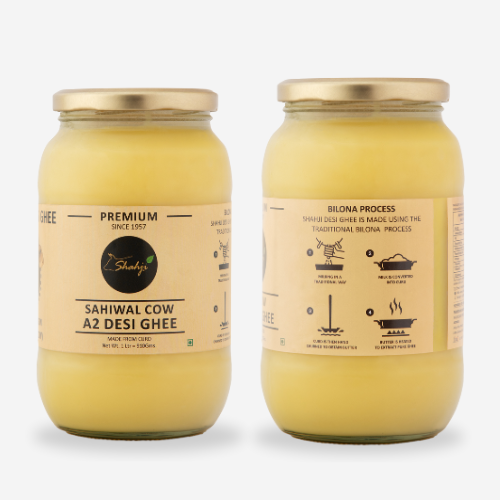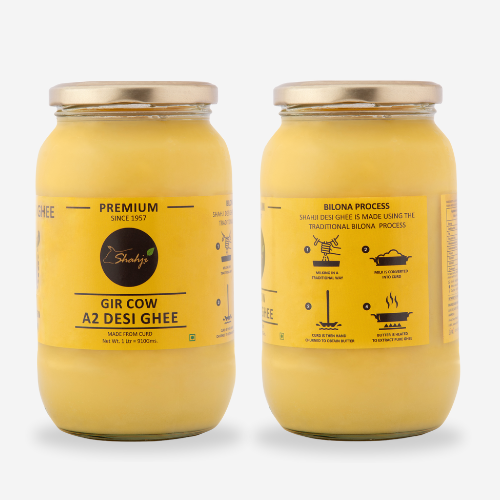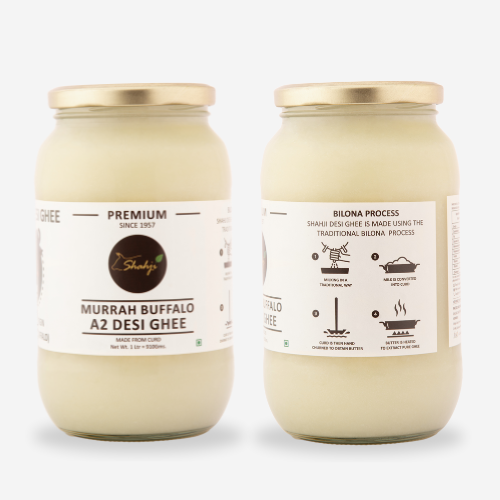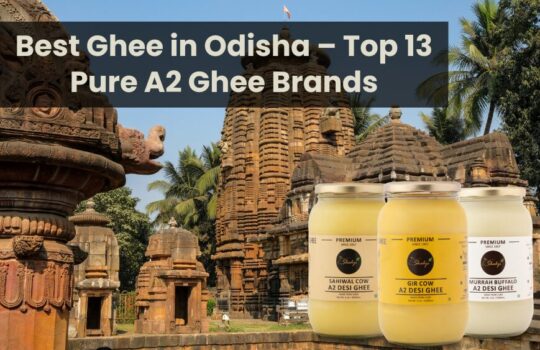Ghee or Butter: What’s Better for Cooking & Health?
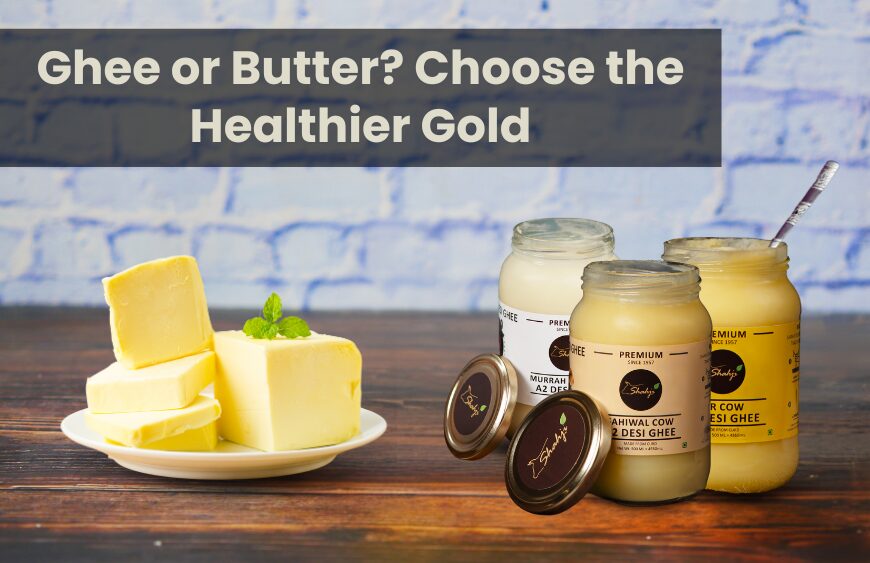
Whether it is in the cullinary world or modern homes, ghee or butter face off with each other in nearly every kitchen. Both of the products are precious fats and are used in cooking and baking. However, there is disparity when it comes to ‘how’ both ghee and butter are made , the way they react to heat, their nutritional value and much more.
If you’re trying to decide whether to go with traditional desi ghee or stick with butter, this detailed guide will help you make the healthiest, most flavorful choice for your diet and lifestyle.
What is Ghee and How Is It Different from Butter?
Butter
Butter is made by churning cream to separate butterfat from buttermilk. It still contains small amounts of water, lactose, and milk proteins like casein, which can make it less ideal for high-heat cooking or those with dairy sensitivities.
Ghee
Ghee, often called clarified butter, is made by simmering butter to evaporate water and remove all milk solids, leaving behind a pure golden fat. This process gives ghee a higher smoke point, a longer shelf life, and makes it lactose- and casein-free.
Nutritional Comparison: Ghee vs Butter
| Nutrient | Ghee (1 tbsp) | Butter (1 tbsp) |
| Calories | 120 | 102 |
| Total Fat | 14g | 11.5g |
| Saturated Fat | 9g | 7g |
| Lactose & Casein | None | Present |
| Smoke Point | -485°F (252°C) | ~350°F (177°C) |
| Shelf Life | Long (non-refrigerated) | Short (requires refrigeration) |
Key Insight: Ghee is more calorie-dense due to its purity but is also easier to digest and better for high-heat cooking.
Health Benefits of Ghee vs Butter
Benefits of Ghee
- Lactose & Casein Free: Great for people with diary sensitivities or lactose intolerant.
- Packed with Fat-Soluble Vitamins: Provides A, D, E, and K for skin, vision, bones and immune health.
- Promotes Gut Health: Contains butyric acid, a short-chain fatty acid that nourishes the intestinal lining and supports digestion.
- Increases Metabolism: Contains natural CLA (conjugated linoleic acid) that supports metabolism of fat and energy.
- High-Heat Cooking Champion: Doesn’t oxidize easily so it’s one of the safest and healthy fats for frying or sauteing.
Benefits of Butter
- More Easily Accessible: It can be found in nearly every part of the world.
- Good Flavor for Baking: Butter adds creaminess and flavor to pastries, cookies and breads.
- Good Source of Vitamins: Particularly when made from grass-fed cows, butter contains vitamins and trace minerals.
Smoke Point and Cooking Versatility
Ghee has an exceptional smoke point of 485°F making it an ideal choice for deep-frying, roasting and Indian cooking.
On the other hand, butter has a smoke point of only 350°F that limits its use for high heat cooking.
Winner: Ghee – for flavor, flexibility, and health safety in cooking.
Culinary Uses: When to Use Ghee or Butter
| Use Case | Ghee | Butter |
| High Heat Cooking | Best: won’t burn or oxidize | Not ideal: burns easily |
| Baking | Good: adds nutty depth | Best: adds creaminess |
| Spreading on Toast | Good: makes it flavorful and rich | Excellent: makes it creamy and soft |
| Ayurvedic or Keto Diets | Highly recommended | Less suitable |
| Long Shelf Life | Excellent: no fridge needed | Requires refrigeration |
Why Shahji Ghee is the Better Choice
If you’re switching from butter to ghee, the quality of your ghee matters. Shahji Ghee offers:
- Made from A2 milk of native Indian cows and buffaloes (Gir, Sahiwal, Murrah).
- Hand-churned using the traditional Bilona process for maximum nutrient retention.
- Free from all preservatives, additives, and chemicals.
- Rich in flavor, aroma and digestive friendly fats.
With Shahji Ghee, you are not just cooking; you are investing in wellness, tradition, and purity.
Shop Shahji Ghee Online: shahjighee.com
Frequently Asked Questions – FAQs
Which is healthier—ghee or butter?
Ghee is generally considered the healthier option compared to butter. While both are sources of fat-soluble vitamins like A, D, E, and K, ghee has several advantages:
– It is free of lactose and casein, so it is considered acceptable for people with dairy intolerances.
– It has a higher smoke point (485°F vs butter’s 350°F), meaning it’s more stable for high-heat cooking.
– It has butyrate, a short-chain fatty acid that is known to help with digestion, decrease inflammation, and support gut health.
– It has a longer shelf life and versatile in cooking.
So if you’re choosing between ghee or butter for overall wellness and cooking functionality, ghee takes the lead.
Can I substitute ghee for butter?
Absolutely—ghee can be used as a 1:1 substitute for butter in most recipes. It’s a versatile replacement that works well for:
– Sautéing and frying (because ghee has a high smoke point).
– Baking (it adds a good nuttier flavor).
– Spreadable on toast or used in sauces.
Is ghee better than butter for weight loss?
Yes, ghee can be more beneficial than butter for people trying to lose weight – especially in moderation and when it comes from A2 milk. Ghee contains medium-chain triglycerides (MCT) and butyric acid, both of which help to boost metabolism and in lowering fat. Ghee makes us feel satiated, which helps us not overeat – you should feel full longer. And, because ghee has no lactose or casein, it is easier to digest than butter and supports healthy gut flora, both of which are crucial for maintaining a healthy weight. When used as part of a balanced diet, ghee becomes a fat that fuels, not one that fattens.
Is ghee better than butter in Ayurveda?
Yes, ghee is considered far better than butter in Ayurveda. Ghee is considered a sattvic food – pure, nourishing, and highly healing. Unlike butter, ghee is used in Ayurvedic practices to balance the doshas, particularly Vata and Pitta, and is believed to enhance Agni (digestive fire). It is also considered medhya, which means it supports cognitive function and mental clarity. Because ghee is free from milk solids, it’s gentler on the digestive system and promotes longevity, detoxification, and cellular nourishment, making it the preferred choice in Ayurvedic wellness over butter.
Conclusion: Ghee or Butter – Which One Belongs in Your Kitchen
Both ghee and butter have their place in the kitchen, but if you’re looking for a healthier, more versatile, and digestive-friendly fat, ghee comes out on top.
It’s perfect for:
- High-heat cooking
- Ayurvedic and Keto diets
- Enhancing gut health
- Long-lasting shelf life
- Deep, satisfying flavor
And when you choose Shahji Ghee, you’re choosing purity, tradition, and wellness—all in one golden spoon.
Make the switch, Feel the difference, Cook with Shahji Ghee

